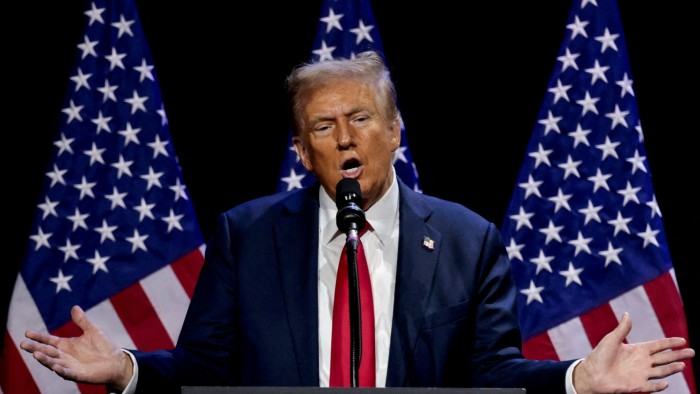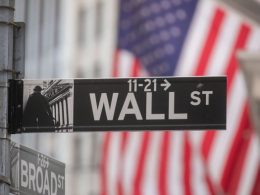Donald Trump will be inaugurated at a swearing-in ceremony in Washington on Monday, marking the formal transition of power from outgoing President Joe Biden.
The incoming White House administration promises a radically different approach to the Biden team on a number of key policy issues, from the economy and trade to the war in Ukraine and international relations as well as immigration and regulation.
Over the past few weeks, FirstFT readers have been asked to submit questions on the issues that matter to them. We received a vast range of suggestions and policy areas for the FT’s experts to address. The questions below have been lightly edited.
Will Trump be able to make our dollar bills more valuable than today? There is talk about other monies, digital, crypto, becoming more important than the dollar bill — Terri Johnson, Hermiston, Oregon
Philip Stafford, digital finance news editor, replies: The short answer is that crypto can’t make your dollars more valuable. That is down to interest rates and government policies. While you can never say never, it’s also highly unlikely that it will ever serve as an alternative to the dollar.
Bitcoin, the original cryptocurrency, started out in the 2008 financial crisis as a way to make payments without using the traditional banking system. But time has showed the limitations of that dream. The value of most cryptocurrencies is just too volatile to work for payments, which rely on the value of the asset being stable.
That said the president-elect has promised a different attitude from Washington to the industry after dozens of lawsuits and penalties were levied by regulators during Joe Biden’s tenure. Trump has vowed to make the US the “world’s bitcoin superpower”, although quite what he means by that is unclear. Regulations that make it clearer to cryptoasset companies what is legal, and what isn’t, are likely to follow. You may read about the end of some long-running lawsuits filed by the regulator against companies. Nor should you be surprised if one or two people imprisoned for crypto-related crimes are pardoned — Trump has mentioned he might do that.
It’s hard to predict what the fortunes of cryptocurrencies will be in the US over the next four years, although everyone in the industry is very enthusiastic. For now the vast majority of cryptocurrencies are used for speculation — bitcoin and others far outperformed the S&P 500 last year — but some people like to hold it as a sort of digital gold, something that is likely to keep its value at times of economic instability.
But there may be other uses for cryptocurrencies that become part of everyday life, in time. One is that companies and people can make payments in stablecoins, which are a sort of crypto dollar, and the payment is effectively made in minutes, and outside the banking system. It’s already happening in some parts of the world. But part of the attraction of these coins rests on them having a stable value, usually 1:1 to the US dollar. So the system ends up relying on the US dollar still being there.

Given the Trump administration’s complex stance on immigration, what impact do you anticipate its policies will have on international students seeking to study in the US? Alia Friedman, London, UK
Andrew Jack, global education editor, replies: Trump’s anti-immigrant and “anti-woke” campaign rhetoric could dissuade some foreign applications to US universities, and slow visa processing. But surveys suggest many international students still admire US education and the potential it offers for future employment opportunities after graduation in a country that remains highly dynamic. A key determinant would be any fresh restrictions on the right of foreign students to remain and work.

How will the Trump administration realistically affect the functions and funding of the National Institutes of Health and Centers for Disease Control and Prevention? Orlando Cervantes, Seattle, Washington
Hannah Kuchler, global pharmaceutical editor, writes: There are conflicting camps within the Trump transition team and within the “Make America Healthy Again” movement so it is hard to be sure which strategy will win out.
One of the more obvious ways to impact the CDC would be to cut funding to its infectious disease division, in favour of investing in chronic diseases. Robert F Kennedy Jr, Donald Trump’s nominee for US health and human services secretary, is anti-vaccine and has spoken about needing to do more to tackle chronic illness. This would, of course, have the biggest impact if the US is affected by an outbreak or epidemic — for example, if the H5N1 virus circulating in birds and cattle in the US begins to be transferred from human to human.
The new administration could also direct funding from the NIH in different ways, for example, towards trying to prove a link between vaccines and autism, or away from members or institutions in the scientific establishment who they disagree with. Both the NIH and the CDC also fund projects around the world, so with a more isolationist approach, those could be cut.

Given the uncertainty for additional US-provided military aid to Ukraine, is there a view that sanctions and in particular secondary sanctions, could be used more aggressively to punish and isolate Russia at a lower cost to the US? Daniel Tannebaum, New York
Felicia Schwartz, US foreign affairs and defence correspondent, replies: While Donald Trump may choose to impose more economic sanctions, there is a limit to how effective additional measures will be. He has said that he thinks sanctions should be used “judiciously”, but analysts do expect they will be on the table. Trump has made clear that he will try to negotiate an end to the war between Russia and Ukraine as soon as possible, and certainly military assistance to Ukraine and additional sanctions on Russia will be bargaining chips in that effort. But there are several significant challenges to increasing sanctions on Moscow that would deliver the kind of effect you are describing.
First, policymakers in the US and Europe are limited in how much they are willing to impose sanctions on Russian energy, which is the most significant source of cash for Russian President Vladimir Putin’s government. Russia plays a significant role in global energy supplies, and Trump will not want to cause the kinds of disruptions that would really hurt Russia but could also lead to higher global energy prices.
Second, Russia has developed a variety of measures to circumvent sanctions after nearly three years of war, such as using alternative financial systems and engaging in clandestine trade networks, both of which have reduced the effectiveness of additional sanctions. Trump might have a bigger impact if he could convince countries such as China and India to do more to prevent Russia from circumventing the current sanctions on the books, but that is a very tall order and comes at a moment when he has threatened a possible trade war with China.

What will the Trump administration’s position on Latin America (often considered the United States’ “backyard”) be? Will it seek to extend the reach, influence and benefits of its “America First” approach (lato sensu), or will it maintain an indifferent stance, thereby perpetuating the root causes of illegal immigration to the US? Eleneaz
Michael Stott, Latin America editor, writes: Trump’s top team brings plenty of Latin America expertise, starting with secretary of state-designate Marco Rubio, a Cuban American. That has excited some observers, who have long lamented the lack of US engagement in Latin America and hope the new administration will provide a more robust response to China’s growing trade and investment in the region.
However, Trump’s recent off-the-cuff comments on issues such as renaming the Gulf of Mexico the Gulf of America and seeking to re-establish US control over the Panama Canal suggest that the president himself, rather than his expert advisers, will be making calls on Latin America policy. Trump has consistently advocated raising tariffs on Mexico and deporting millions of undocumented, mainly Latino migrants, from the US, so the betting has to be that he will follow through on these ideas in office. He is also likely to push Latin American countries hard to decouple their economies from China and deepen commercial and investment ties with the US instead.

I heard a claim, from an American blogger, that some countries do not allow entry to people who have a criminal record. If this is true, how might, say, the UK government, handle a request for President Trump to play a round of golf on one of his UK golf courses or indeed a visit as head of state. Reverend Philip Dobson, Manchester, England
Lucy Fisher, Whitehall editor, answers: The UK government has a legal right to refuse entry to individuals on the basis of criminality, but this is usually applied to offenders who have received a custodial sentence of more than 12 months — and in other cases discretion may be exercised.
Donald Trump will be the first president who is a sentenced felon, but he has served no prison time. A New York judge handed the politician an unconditional discharge sentence in his “hush money” case last week. As such he would not meet the usual threshold for a potential ban.
But far from looking for excuses to block Trump visiting, senior UK government figures are hopeful of an early trip from the incoming president, in order to cement bilateral relations and help protect Britain from the harm of any potential tariffs he imposes.
Whitehall officials predict a second invitation for a state visit will be extended to Trump, with the UK royal family — whom Trump holds in high regard — heavily deployed as part of the charm offensive.
Trump’s mother was born on the Isle of Lewis in the Outer Hebrides, and he has spoken in the past about his affinity with Scotland, where he now owns golf courses. The UK government is hoping to exploit this link to bolster the so-called special relationship.

George W Bush campaigned on no longer having the US perform “regime building” and then after he was inaugurated did exactly that. Trump hasn’t been that explicit but regime building fits awkwardly with America First. Which countries or regions will Trump 2.0 decide are worthy of regime building? Bill Byrne, Portland, Oregon
Peter Spiegel, US managing editor, responds: Trying to predict Trump’s foreign policy is a bit of a fruitless exercise since, as we saw during his first term, many of his most important decisions are made in the moment and not based on an ideological view of the world. That said, I would be very surprised if he used American troops to engage in the kind of nation building that characterised the Bush administration.
Trump and his team — especially JD Vance, his vice-president — have been very vocal in their criticism of the so-called neoconservative wing of the Republican party, which surrounded then-President Bush and served as his foreign policy brains trust. Those “neocons” were the prime backers of the kind of nation building that took place in Iraq and Afghanistan, as well as smaller interventions in countries such as Haiti and Liberia. What we saw in Trump’s first term was exactly the opposite: an effort to bring American troops home, coupled with a proclivity for air power and long-range missile strikes on adversaries like Qasem Soleimani, head of the Iranian Quds Force, who was killed in an air strike in 2020. Neocons have been pointedly excluded from Trump’s foreign policy team and openly ridiculed as “Republicans in name only” by Trump and his allies.
Source link









